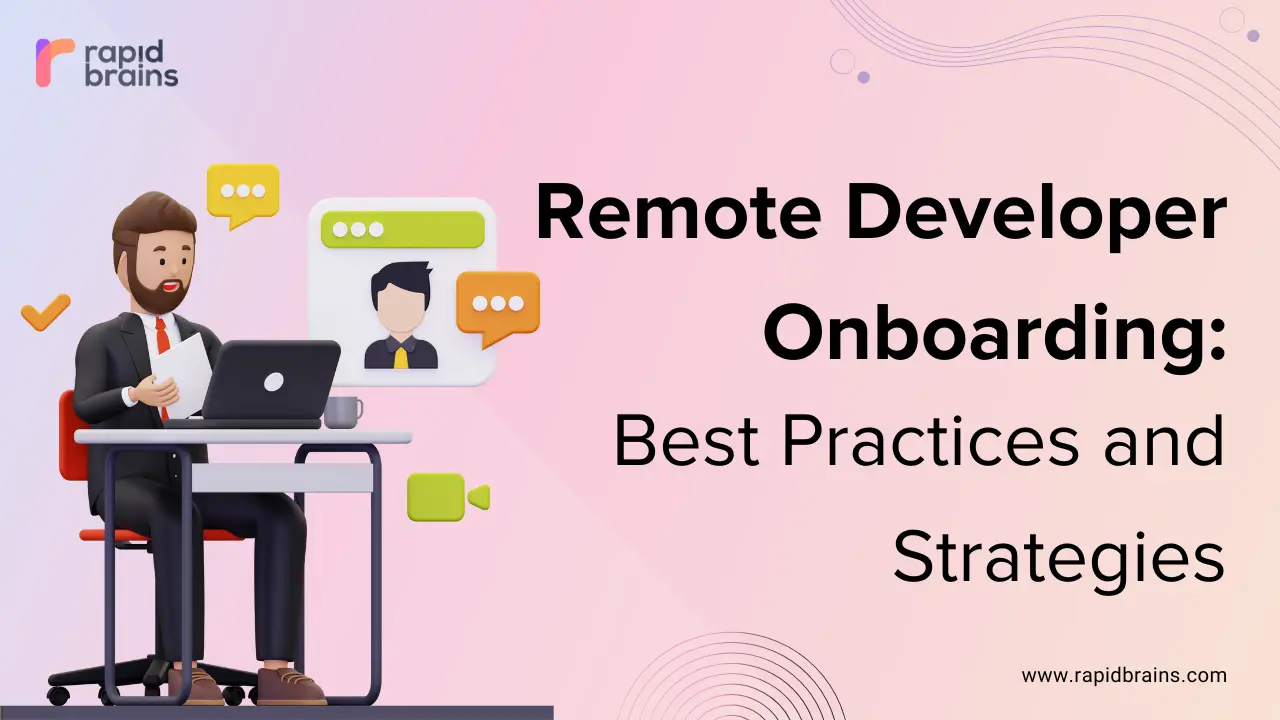
Introduction:
With the rise of remote work, organizations are recognizing the advantages of hiring remote developers. However, onboarding remote developers can be challenging. In this blog post, we will delve into the best practices and strategies for remote developer onboarding. By following these practices, companies can seamlessly integrate new remote team members and ensure their success. Clear communication, well-defined expectations, structured onboarding plans, collaborative tools, regular check-ins, knowledge sharing, and continuous learning opportunities are essential components. By implementing these strategies, organizations can overcome the unique challenges of remote developer onboarding and create a strong foundation for remote teams to thrive in the ever-evolving work landscape.
Clear Communication and Expectations:
Clear communication channels are vital for remote developer onboarding. Define roles, responsibilities, and expectations clearly to align with team and project goals. Leverage video calls, chat platforms, and project management tools for effective communication. Use project management tools to track progress and assign tasks. Foster team-wide collaboration through virtual spaces for discussions and updates. Establish communication norms and guidelines for remote developers. By prioritizing clear communication, organizations can ensure a smooth and successful onboarding experience for remote developers.
Structured Onboarding Plan:
A structured onboarding plan is crucial for remote developers. Begin with a detailed orientation to the company, its culture, values, and objectives. Provide comprehensive documentation, video tutorials, and access to knowledge repositories to facilitate the learning process. Assign a mentor or buddy to guide the new remote developer and offer continuous support throughout the onboarding period. This personalized guidance helps remote developers navigate the organization, understand their role, and integrate into the team. By implementing a tailored onboarding plan, companies ensure remote developers feel welcomed, supported, and equipped with the necessary resources to thrive in their new role.
Collaborative Tools and Technology:
To enable seamless collaboration, it is vital to equip remote developers with the necessary tools and technology. Provide them with access to project management tools, version control systems, communication platforms, and virtual meeting software. These tools facilitate effective communication, task tracking, and knowledge sharing among remote team members. Additionally, offer guidelines on best practices for utilizing these tools to enhance collaboration, such as establishing communication norms, setting project milestones, and ensuring consistent documentation. By providing the right tools and promoting their effective use, organizations can foster collaboration, improve productivity, and enhance the overall success of remote development projects.
Regular Check-ins and Feedback:
Regular check-ins and feedback sessions are essential for supporting remote developers during their onboarding process. These sessions provide an opportunity to address any challenges they may be facing, clarify expectations, and offer constructive feedback. Encouraging open communication enables remote developers to voice their concerns, ask questions, and seek guidance. This inclusive environment fosters a sense of engagement and promotes a positive onboarding experience. By providing ongoing support and communication channels, organizations can ensure that remote developers feel valued, supported, and integrated into the team from the start of their journey.
Encourage Knowledge Sharing and Team Bonding:
Promoting knowledge sharing is crucial for remote developers and the wider team. Encourage the use of collaboration platforms and virtual whiteboards to share ideas, code snippets, and best practices. These tools facilitate real-time collaboration and foster a culture of learning. Additionally, conduct virtual team-building activities and social events to foster team bonding and create a sense of camaraderie among remote team members. These activities help build relationships, strengthen communication, and promote a positive team dynamic. By fostering knowledge sharing and team bonding, organizations can leverage the collective expertise of their remote developers and create a collaborative and supportive work environment.
Documentation and Onboarding Resources:
Comprehensive documentation and onboarding resources are vital for supporting remote developers. Create detailed guides, FAQs, and a centralized repository of resources and references. These materials should cover essential information about the company, its processes, tools, and best practices. Ensure these resources are easily accessible and searchable, enabling remote developers to find answers and information independently. This empowers remote developers to onboard efficiently, reduces dependency on others, and promotes a self-sufficient approach. By providing comprehensive documentation, organizations facilitate a smooth onboarding experience and enable remote developers to quickly become productive contributors to the team.
Continuous Learning and Professional Development:
Continuous learning and professional development are crucial for remote developers. Provide access to relevant training resources, online courses, and workshops to enhance their skills. Encourage participation in webinars, conferences, and industry events to stay updated with the latest technologies and trends. By investing in their learning, organizations empower remote developers to grow professionally and contribute to the success of projects. This commitment to ongoing development not only benefits individual remote developers but also strengthens the overall expertise and competitiveness of the team. It demonstrates the organization’s dedication to supporting the long-term career growth and satisfaction of remote developers.
Conclusion:
Effective onboarding of remote developers is crucial for their success within a company. By implementing these best practices and strategies, organizations can ensure a smooth transition for remote developers, fostering engagement, productivity, and collaboration. Clear communication, structured onboarding plans, collaborative tools, regular check-ins, knowledge sharing, and continuous learning opportunities all contribute to a positive onboarding experience. Embracing these practices will enable organizations to unlock the full potential of their remote developer teams and achieve long-term success in the remote work landscape.




